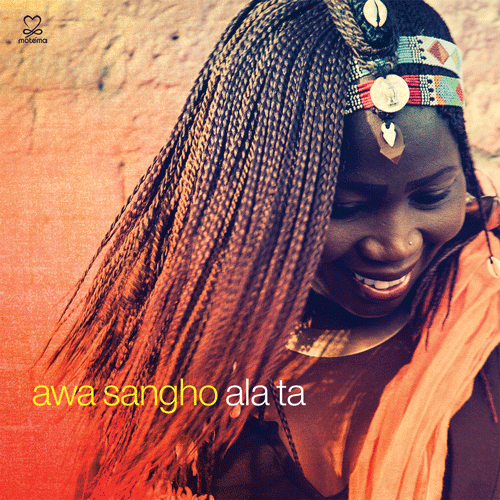Awa Sangho began her musical life in Dire, near Timbuktu, Mali, then moved on to Bamako and Abidjan—where she enjoyed a distinguished career as a singer/dancer/actress in Ensemble Koteba, and a front person in Les Go de Koteba—and since 2011, New York City. Her life has been rich with travel and experience, all reflected in her elegant, wide-ranging debut album, a work that establishes her as one of the most powerful and creative African singers now living in the United States.
Full disclosure: I have watched Sangho’s career develop at close range, and I wrote sleeve notes for this CD, so I’ve been listening to it for a number of months now. It is a multilayered work, based on tracks she created with her husband, percussionist extraordinaire Daniel Moreno, and producer Mao Otayek, who was Alpha Blondy’s musical director for years, and plays bass and guitar throughout this recording. Sangho and Moreno took the tracks to Mali, where they added contributions from the likes of ngoni master Bassekou Kouyaté, Zumana Tareta on one-stringed horsehair fiddle, and Sidiki Diabaté (son of Toumani) on kora.
For all that, what stands out most here is Sangho’s voice. She sings from a deep place, and often channels the melancholy that comes with a life of displacement. Music is her salvation, and both pain and an elated sense of rescue come across in her elegant vocal performances. Sangho sings about motherhood on “Ne ba ne n’fa/My Mother and Father” and on “Bamounan,” about the cloth that ties a child to its mother’s back, and how that tie evolves through life to the point where the child must care for the mother. Children are a huge concern in these songs, and fate, as in the title track “Ala ta ye Tougnaye/The Truth Belongs to God.” Sangho’s voice has terrific range, from the gentle griot-like cooing of “Denko/The Problems of Children” to the explosive, full-throated vocal fireworks of “Bamounan.” This is a big voice, informed by a number of West African traditions but not beholden to any.
The production is unusual, and a welcome departure from West African singer/songwriter formulas. There are rich layers of percussion, but no trap drums. The result is an open, airy atmosphere that lets detail come forward. Otayek’s guitar nods to tradition, but mostly departs from it tastefully, as on “Ne ba ne n’fa” where his echoing, spacious acoustic guitar chords wrap around and contrast with the percussive plink of Lasine Kouyate’s balafon. Jazzy harmonies come into play at times, but they’re never overdone. Traditional sounds, notably fine Fula flute (tambin) playing from Bari, are omnipresent, keeping the sound earthy and real for all its polish.
In all, an exceptional debut, well worth the many years it has taken to reach us.
NOTE: Awa Sangho and her band perform music from Ala Ta at the CD release party at SOB’s, 204 Varick St., NY, NY 10014, Wed., Oct. 1. Doors 7 p.m.; showtime 9:30 p.m.









